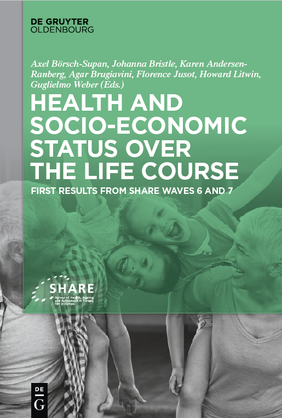SHARE Book Release in Brussels - June 25, 2019
First results of SHARE Wave 6 and 7 - Health and socio-economic status over the life course
Based on the data from the panel’s 6th and 7th Wave, SHARE’s First Result Book presents 38 short studies covering the topic Health and Socio-economic Status over the Life Course.
We kindly invite interested researchers, policy makers and journalists to attend our book release event, which will take place in Brussels, on June 25, from 11 am at Palais des Académies, Rue Ducale 1.
Scientists and policy makers will discuss insights from the survey as well as their use for evidence-based policymaking. Among the speakers will be:
- Host - Prof. Dr. Axel Börsch-Supan (Principal Investigator and Managing Director of SHARE-ERIC)
- Anna Lönnroth Sjödén (Head of Strategy, Dir E – Health, DG for Research and Innovation)
- Dr. Monika Queisser (Head of Social Policy, OECD)
- Dr. Agnieszka Chłoń-Domińczak (Warsaw School of Economics)
- Katarina Ivanković-Knežević (Director Social Affairs – DG for Employment, Social Affairs and Inclusion)
- Prof. Dr. Hendrik Jürges (University of Wuppertal)
A complete agenda for the event can be found here.
If you are interested in attending the release, please contact Stephanie Lasson: lasson©mea.mpisoc.mpg.de. Please note that places are limited.
About the book
A person’s health, economic status and social embeddedness is not determined in isolation. Rather, mutual interactions over the entire life course shape them; departing from an individual’s biological make-up, parental conditions and early education. The Survey of Health, Ageing and Retirement in Europe (SHARE) puts special emphasis on the interplay among the triangular connections of health, social embeddedness and the socio-economic status of older individuals.
Waves 6 and 7 add three important innovations to this triangle and make SHARE a powerful tool for investigating ageing societies in Europe: Wave 6 deepens the objective measurement of health via biomarkers obtained from dried blood spot samples (DBSS). In addition: Wave 7 finally covers all 26 continental EU member states plus Switzerland and Israel and further strengthens SHARE’s longitudinal dimension by collecting life-history data in all 28 countries. By its seventh wave, SHARE has interviewed around 140,000 respondents resulting in about 380,000 completed interviews.
Many contributions in this First Results Book use the life-history data from Wave 7, as well as earlier life histories collected in Wave 3, resulting in varying studies: From the development of personality in early childhood and its influence until late in life; over the generation of health inequalities during the life course by inequalities in education and income; the description of labour market careers, occupation and retirement; to social transitions in the new accession countries and the effects of the economic crisis.
Other parts exploit the longitudinal social network data obtained in Wave 6, another innovation of the SHARE panel. Such data permit studies on the interactions between health and its social context. In addition, healthcare and health behaviours are subject of the book, as well as objective health measures, which contribute to our understanding of the ageing process. Finally, SHARE’s First Results Book Wave 6 and 7 offers a first look at one of the surveys latest innovation, the dried blood spot analyses.
The complete First Results Book of Waves 6 and 7 is available online.


